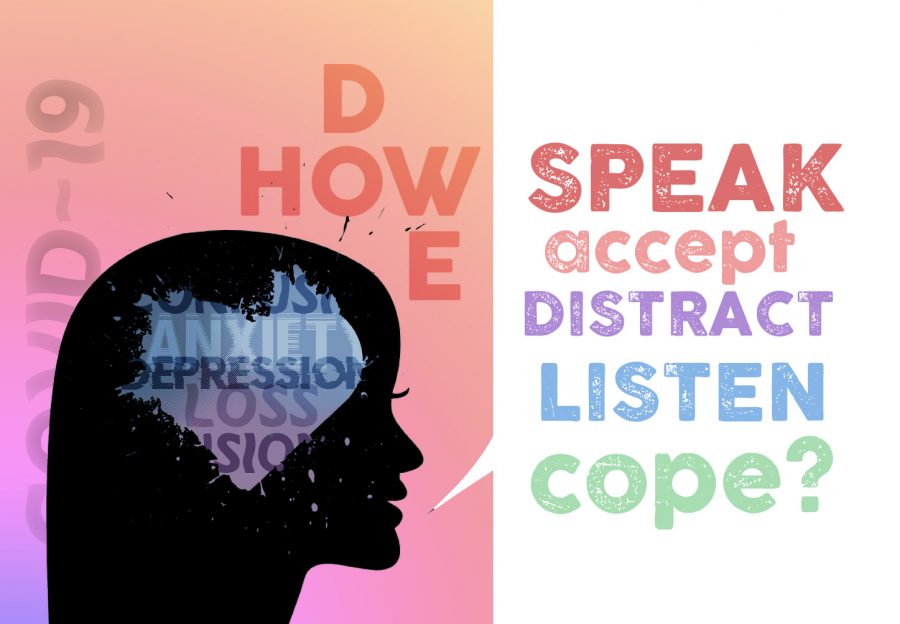COVID-19 And Mental Illness
How Has Quarantine Impacted Mental Health
Students are challenged with transitioned online learning and their mental illness.
May 5, 2020
Fear, uncertainty and alarm have been sweeping the globe as the pandemic expands. The harsh global impact of COVID-19 has caused schools and businesses to shut down. Safety precautions to ensure that the populous stays physically healthy has come with strong momentum however, the mental health of citizens should also be accounted.
Specifically, the loss of routine and social interaction that school and work provide can negatively impact one’s mental health by creating or amplifying a feeling of loneliness. If someone has a pre-existing mental condition staying at home isolated poses a major threat to their health. Maintaining a routine is a well-known way of managing depression, so mental conditions tend to worsen as unproductivity rises.
“I lost a lot of motivation since starting online schooling, and lack of social interaction just kind of makes depression harder to manage since I can’t really go and physically talk to people. Texting kind of helps but seeing that person really helps boost my mood,” senior Anastasia Madrid said.
As a word of emphasis, it is important to acknowledge that many people are now only left with harmful thoughts since distractions like school, work and face-to-face interaction have been taken away. In quarantine, these negative thoughts grow stronger and it becomes easier to believe that there is no one to open up to. Many students with pre-existing mental conditions have also been disconnected from mental health professionals they were previously seeing.
“I was diagnosed with depression around the age of 8. I have monthly therapy sessions with a therapist but that’s obviously been cancelled,”senior Alex Olivares states.
Mental health professionals are crucial to maintaining or improving one’s mental health through techniques like cognitive behavioral therapy (CBT) and psychoanalysis. The loss of these practices has allowed for some student’s mental health to deteriorate. To combat the strong feeling of loneliness that many students are facing, Osceola County has developed resources to provide comfort to struggling students and parents.
“We understand that many of our students and parents may have mental health questions or concerns and may want to talk to their social worker, counselor or a mental health professional during this time. We will be happy to connect you to a mental health professional assigned to your school who can return your call during regular school hours. Please call 407-343-8787,” Osceola County, said.
Touching more on the state of confusion people are facing, essential workers deal with the stress of not being able to stay safe at home, due to having to provide for themselves or their family. Furthermore, through studies conducted by the Kaiser Family Foundation (KFF), it has been proven that parents are rapidly losing their jobs or parts of their salary as a result of a worsening economy.
“55% of workers say they have lost a job or income since February due to coronavirus. Among those families affected, more than a third have fallen behind on their credit card and other bills, and 1 in 4 have fallen behind on their rent or mortgage. 42% of all adults say that either they or their spouse or partner experienced a job loss or a cut in salary or hours due to the coronavirus,” Kaiser stated in their study.
Concerning the student body, a student’s mental health is likely to decrease as their parents begin to worry about finances, on top of the many other stressors the pandemic has caused. Symptoms students face as a result of witnessing financial stress often correlate with anxiety and depression.
“Our family has worried about money for years, and it has caused a lot of conflict that I have witnessed my entire life. To make ends meet, my mom has had a stable online customer service job for years. Recently, she got fired and it has caused a lot of shock and grief for our family. She was working full-time, so the majority of our monthly bills were covered by her. Most of her co-workers that were working full-time also lost their jobs,” an anonymous senior said.
A decline in mental health, as well as untreated mental illnesses have proven to cause a ripple effect. Based on studies from the 2003 outbreak of SARS and the 2014 outbreak of the Ebola virus, healthcare workers and infected people were discovered to have developed debilitating mental illnesses. Additionally, global fear and deteriorating health were counterproductive in virus management.
“As during the 2003 SARS and 2014 Ebola virus disease outbreaks, generalized fear and fear-induced overactive behavior were common among the public; both can impede infection control. Psychiatric disorders, such as depression, anxiety, and posttraumatic stress disorder, developed in high-risk persons, especially survivors and frontline healthcare workers,” the Centers for Disease Control and Prevention (CDC) said.
This ripple effect highlights the importance of managing one’s mental health during this troubling time. However, the CDC advises the public to keep an eye out for worsening symptoms, especially if you are a parent watching your children.
“Not all children and teens respond to stress in the same way. Some common changes to watch for include…excessive worry or sadness, unhealthy eating or sleeping habits, irritability or ‘acting out’ behaviors in teens, poor school performance or avoiding school, difficulty with attention or concentration, avoidance of activities enjoyed in the past, unexplained headaches or body pain, and use of alcohol, tobacco, or other drugs,” the CDC stated.
The CDC also emphasizes that feelings of social isolation are common during the pandemic, so nobody is alone. Checking in with those you love through personal conversations, helping those who take medication, turning off the television if news becomes too stressful, and acknowledging their emotions are ways you can do your part in helping maintain emotional stability. Some students have also picked up new hobbies to counter negative thoughts and promote healthy distraction.
“I usually just listen to music more and I’ve picked up on gardening a lot more,” Madrid said.
Organizations have taken action to provide resources to those concerned about their mental health, encouraging students to feel less lonely during a time of chaos and isolation. Spreading awareness of coping strategies to those around you is also helpful according to these organizations.
“Acknowledging, recognizing and acting on mental distress in these uncertain times is key to lessening the impact,” National Alliance on Mental Illness (NAMI) said.



